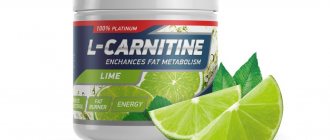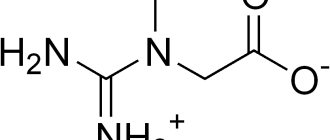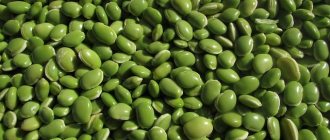Muscle hypertrophy
Despite the fact that many laboratory studies have been conducted with creatine, the study of the beneficial properties of this acid does not stop. After several experiments, the main effect on the organic resource was revealed - increasing the endurance of muscle cells by reducing the glycogen content in them.
Recently, after a series of experiments, it was found that creatine improves the production of a protein of fibrillar structure - myosin. This element, in turn, stands alongside the main components of myofibrils - contractile muscle tissue. These are precisely the fibers that take the main part in performing various types of exercises in iron sports, since they squeeze and pull weights.
The results of the research became sensational in certain circles. Not stopping there, several more analyzes were done. With their help, it was established that in a short period of use creatine acid can have a positive effect on the body of people who are prone to rapid muscle loss.
The natural and first explanation for the increase in muscle mass (hypertrophy) is the fact that creatine is able to flood it. But, as it turned out, in addition to water retention, after a short course of taking the supplement, they found a general expansion of muscle fiber - not only due to an increase in energy sarcoplasm.
To date, it has been successfully proven that creatine slows down the process of protein destruction in the athlete’s body.
Contraindications
According to numerous experimental studies, no direct harm from the use of creatine has been identified. Its consumption in the recommended amount is no more harmful to the body than meat dishes. However, the substance has some side effects (occurring in approximately 4% of cases among the total number of users) - moisture retention in the body. To eliminate it, you do not need to take diuretics. Excess water is eliminated naturally during the next break in intake.
An individual reaction is also allowed, which is accompanied by an upset digestion process. To eliminate symptoms, it is necessary to reduce the dosage and monitor the body’s reaction (in extreme cases, stop taking additional doses).
Important! If you have chronic diseases (for example, asthma and various food allergies), you should consult your doctor about additional use of creatine supplements during pregnancy.
See other articles on the topic:
The benefits and harms of creatine for the male body
Increased IGF-1 activity
IGF-1 (will stand for Insulin-like growth factor 1) is a biologically active nutrient that has an anabolic effect and is a transmitter for the effects of the hormone somatropin. It is synthesized only in the liver and in the muscles themselves. In addition, it further promotes muscle hyperplasia due to an active surge in myosatellites.
After some failed experiments on animals, it was decided to put one on humans. It was this study that made it clear that creatine increases IGF-1 activity. On average, in athletes who take creatine, it increases by 30%. It would seem that such an effect from creatine is expected by an athlete after taking the supplement on a training day, and on days without strength loads it is useless. True, but half. On days without training, IRF-1 activity remains at the same level. But creatine intake must be consumed regularly to maintain its levels in the body.
From general observations of athletes taking such a supplement, it was noticed that a special “surge” in muscle mass growth is observed in the final days of the monthly course.
What is creatine: chemistry, steroids or not
Creatine is a nitrogen-containing carboxylic acid that is present in the body of all vertebrates. Such a compound can be synthesized by internal organs from amino acids (arginine, glycine, methionine). However, the body receives the overwhelming dose of the substance from food. This type of food includes red meat; you cannot get creatine from plants.
An athlete weighing 80 kg needs approximately 2 grams of creatine per day. To obtain such a portion of the beneficial substance, you will need to eat at least 900 grams of beef or veal daily.
Interesting! Creatine was discovered back in 1832 by French researchers. But it wasn't until 1926 that the scientific community was able to prove the substance's important role in muscle building. Now this additive is approved for use by the Olympic Committee.
Creatine is one of the most studied and safest supplements. This is a natural substance that is produced daily in the body and consumed with food. This compound does not belong to chemical stimulants and steroid hormones.
Be sure to check out:
Shelf life and storage of creatine Is it possible to mix BCAA with creatine and what can this lead to? Creatine and protein: rules for taking it together How to take creatine and gainer together
Creatine prevents age-related muscle loss
Age-related muscle loss is quite common among athletes over 40 years of age. Such a malfunction not only violates the aesthetics of the body, but also contributes to the development of bone fragility and general weakness. This occurs due to a decrease in the main sex hormone - testosterone. In turn, this helps reduce creatine production. This situation promotes muscle loss. As a result, whether you like it or not, a person’s quality of active life decreases.
It can be assumed that supplying the body from other sources coupled with strength loads will be able to stop the death of muscle cells. In addition, everything will happen the other way around, muscle mass will begin to increase.
Creatine can be taken at any age. The supplement has no age-related contraindications.
Glycogen preservation
Glycogen is a glycan, the basis of which is glucose residues in the body. Simply put, it is one of the main sources of energy for an athlete's muscle cells. The only disadvantage of glycogen is that its supply is limited, and it is depleted relatively quickly during training.
Previously, only theory and guesswork stated that supplements containing creatine significantly slow down the depletion of glycogen reserves (depending on the amount of creatine in the composition). Now this assumption has been confirmed by science. Thus, it was established as a result of Brazilian studies and experiments: creatine plays the role of an additional supplier of energy units to the body. The process of inhibiting glycogen loss occurs in both muscles and liver.
This effect is great for athletes who are looking to push the limits of their endurance. It is because of this that creatine is recommended to be used not only by bodybuilders, but also by football players, runners, wrestlers, fighters, crossfitters, basketball players and representatives of other sports where aerobic exercise occurs.
As for bodybuilding, everything is a little more complicated. There are stages of bodybuilder training in which the end result is the complete depletion of glycogen from its reserves. In this case, creatine is excluded from the supplement complex.
Is it sold in pharmacies?
Similar to protein, vitamins, minerals and other beneficial supplements, creatine is sold in tablets at the pharmacy. However, the supplement can not be found in all pharmaceutical chains.
Due to low demand in regular pharmacies, sports nutrition is ordered extremely rarely - often only 2-3 budget segment companies are represented on the shelves. Such products may contain reduced dosages of the active substance and use raw materials of low quality, compared to well-known brands of sports nutrition.
Also, pharmacies are significantly inferior to specialized stores, since not all pharmacists are able to provide high-quality advice regarding creatine and its use.
The cost of creatine in pharmacies also differs from prices in sports nutrition stores and large online markets. At specialized points of sale, goods are purchased in wholesale quantities, which reduces overall procurement costs. In pharmacies, the situation is the opposite - creatine is supplied in small quantities without wholesale discounts, and costs for the services of resellers are often added.
Creatine and insulin
Any experienced bodybuilder knows many ways to dilute a creatine supplement to enhance its performance. Eg:
- dilution with grape or cherry juice;
- juice with high insulin levels.
The main goal of such creatine dilution regimens is to deliver the maximum possible amount of insulin into the blood. Everything seems simple, but not everything simple turns out to be brilliant. This is where the error lies.
The whole point is that creatine has a hidden property that not everyone knows about - partial blocking of insulin entering the circulatory system. And he does this, believe me, “conscientiously.” Here is the conclusion: there will always be not enough insulin to eliminate creatine in the blood. The only trick that can work in this situation is to use insulin injections 30 minutes before taking the next portion of creatine.
By the way, insulin is a peptide hormone that is involved in all kinds of metabolism in the human body. Its main advantages for an athlete are:
- suppression of blood glucose levels;
- anabolic effect (increases protein synthesis, production of fatty acids, etc.);
- anti-catabolic effect (slows down the breakdown of proteins, blocks the release of fatty acids into the blood).
Admission Tips
Advice on whether you can drink creatine or not should be given to you by your trainer or doctor, but not by a friend or relative (the only exception is for a friend/relative - trainer/doctor).
The substance is a natural supplement, so any negative sensation from taking it should first alert you, and if unpleasant consequences continue, you should give up creatine altogether.
Under no circumstances should you drink creatine powder, protein and amino acids for a long time at the same time. Your body may become so accustomed to the constant influx of necessary substances that it will not be able to produce these elements itself.
Remember, drinking plenty of fluids is very important. When using creatine, you need to drink at least 2 liters of water per day. This will help absorb the substance and avoid negative consequences.










